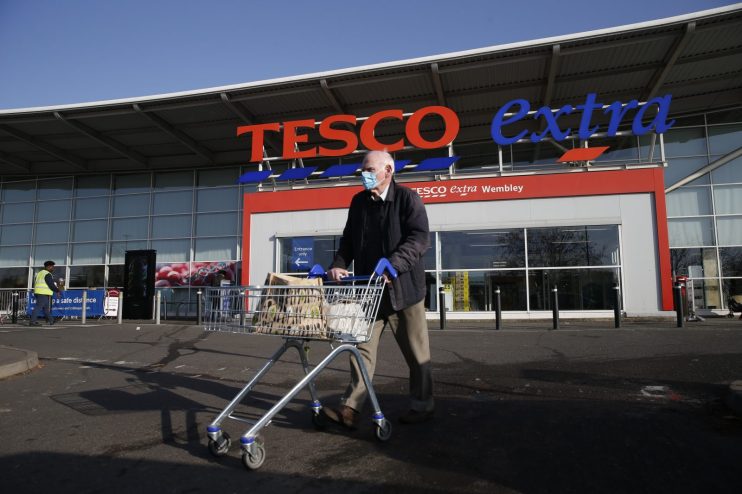Tesco hit by inflation and supermarket war with Aldi and Lidl as profit down almost seven per cent

Tesco, Britain’s biggest supermarket, was hit hard by consumers tightening their belts during the cost of living crisis, as it reported its operating profit was down almost seven per cent on last year.
The London-listed chain said its profit was £2,6bn for the year to the end of February which was down 6.9 per cent on last year, amid a supermarket war with Aldi and Lidl.
It was widely expected to be down as analysts closely watched its share price since last Friday.
Despite falling operating profit, Tesco said its sales were 5.3 per cent up at £57bn, with fuel sales seeing a 23 per cent bump, as millions of customers were hit by rising prices at the pumps.
Its chief executive Ken Murphy reflected on the “incredibly tough year for many of our customers” saying it has “been determined to do everything we can to help.”
Tesco, he said, had tried to keep prices down and support staff in the cost of living crisis, with inflation in double digits , saying “we have paid our suppliers for their products, and the cost of running our own operations. I am very proud of the way the Tesco team has responded to these challenges and would like to thank every colleague for the contribution they have made.”
Amid an apparent supermarket war with German discount giants Lidl and Aldi, which are eating up an increasing chunk of the UK market share, he said Tesco is at “the most competitive we have ever been, with our market-leading combination of Aldi Price Match, Clubcard Prices and Low Everyday Prices changing the way customers perceive value at Tesco.”
Despite disappointing results, he said Tesco will “continue to target growth” with a focus on opening new stories, including 91 new outlets this year, in addition the acquisition of nine Joyce’s stores in the Republic of Ireland and the Paperchase brand.
“We have already bought back over £1bn worth of shares and have today announced a further £750m worth over the next twelve months” he added.
I am really confident that by investing to give customers the best possible value and continuing to look after our colleagues, we will create further significant value for every stakeholder in Tesco.”
Looking ahead to the rest of 2023, Tesco it is expects “a broadly flat level of retail adjusted operating profit in 2023/24 and retail free cash flow within our target range of £1.4bn to £1.8bn. We expect Bank adjusted operating profit of between £130m and £160m.”
How will investors react?
Following Tesco’s results this morning, its share price rose slightly by around 1.5 per cent. Analysts at Hargreaves Landsdown said “Tesco has seen profits take a knock as inflation means struggling customers are picking up fewer items while prices soar.
“At the same time, the grocery giant is investing heavily in its customer care while times are so tough. While the group is doing what it can to keep prices low, it’s not lost on consumers that grocery inflation remains one of the most painful areas of overall rising costs at the moment.
“That’s where we’ve seen the rise of the discounters, which although much smaller, have forced the main players to up their game. Aldi price matches and other similar campaigns are a stark reminder of how stiff competition is.
“By some trains of thinking, if you’re having to name your competitor, they’ve already won.”
Reflecting on how investors will now be reacting, Hargreaves said Tesco shareholders “will be watching margins closely.”
“It was a few years ago we last saw prolonged single digit margins in the grocery sector as there was a race to the bottom on prices. Limiting a repeat of that will depend on when consumer resilience bounces back.
“Food costs may struggle to come down until energy prices temper, which could slow progress on that front. At the same time, the retail business has over £2bn of free cash pumping through its veins, making Tesco a resilient name in the sector. And, crucially for investors, it means the dividend is still being served.”
Meanwhile, Zoe Gillespie, investment manager at RBC Brewin Dolphin, said: “Tesco is continuing to cement its position as the UK’s top supermarket.
“Profits may be down, but that was to be expected from the pressures of the cost-of-living crisis and post-pandemic normalisation in shopping habits.
“Sales growth, meanwhile, remains robust and Tesco is well placed to benefit from consumers looking to save on their weekly shop through its different initiatives – particularly its Clubcard scheme. While profits are expected to be flat for the year ahead, the continuation of its share buyback scheme and strong execution of its strategy mean Tesco remains in good shape.”
